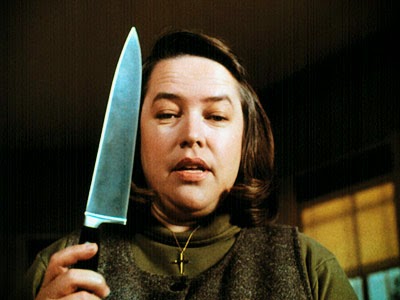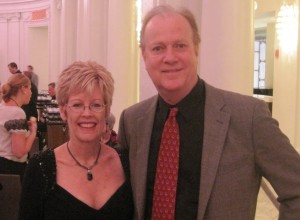By Mark Alpert
Last month I had the great pleasure of reading Stephen King’s Misery to my 15-year-old son. Actually, I read only about a quarter of the novel to him; he read most of it on his own, devouring the chapters while he rode the subway to his cross-country team practices. I’d never read Misery before. I saw the movie when it came out in 1990 and loved it. In fact, that’s why I didn’t read the novel for almost a quarter-century. I doubted it could be better than the movie.
But the book is better. It’s even more disturbing and gruesome. In the movie, the insane nurse Annie Wilkes (played so wonderfully by Kathy Bates) punishes her bedridden captive Paul Sheldon (played by James Caan) by breaking his ankles with a sledgehammer. But in the book she chops off his left foot with an ax and cauterizes the stump with a blowtorch. Then, for good measure, she cuts off his thumb with an electric carving knife. But she’s also careful enough to apply a coat of Betadine antiseptic to both the knife and the ax blade. One of the most memorable parts of the novel is the image of the carving knife in motion, flinging drops of Betadine every which way as it saws back and forth. As my son put it: “That picture really stays with you.”
What’s more, King uses the novel to make several interesting points about writing. Paul, the narrator, is a bestselling novelist (like King) who’s loved by millions of readers but disliked by many reviewers (again like King, at least back in the 1980s). Annie is Paul’s deranged “number one fan.” At the start of the novel, before all the torture and amputations, Paul tries to explain some of the techniques of fiction to Annie, but she has no interest in them — she’s strictly a reader, not a writer. And yet she’s passionate about the books she reads and gets furiously upset at implausible plot twists. (“HE DIDN’T GET OUT OF THE COCKADOODIE CAR!”)
King explores the issue of plausibility by having Paul recall a childhood memory. He remembers a grade-school class where the teacher encouraged Paul and the other students to play a game called “Can you?” The students would collectively tell a story, with each boy or girl contributing a few twists and turns, and when the story reached a point where the hero faced an impossible dilemma, the teacher would challenge the students to come up with a way out of the fix. She would ask, “Can you?” and the student who accepted the challenge would propose a solution, and then the other students would vote on whether it seemed plausible.
This reminded me of a different game my wife and I still play with our kids during long car rides: the Fortunately/Unfortunately game. The kid playing the Unfortunate role thinks up terrible disasters while the Fortunate kid thinks of ways to escape death and ruin. Both of these games are good exercises for budding novelists. (In our family’s case, though, the games usually go downhill fast. We don’t do well on long car rides.)
Halfway through Misery’s plot, Paul realizes that only writing can save him from his own impossible dilemma. He starts writing a novel that rivets Annie, preventing her from killing him until he finishes the book. King’s descriptions of the writing process are spot-on. Paul talks about seeing a hole in the piece of paper he’s typing on, and through the hole he can see what’s going to happen next in his book. On some days the hole is big, on other days it’s tiny. He also talks about ideas that pop up from the unconscious mind, which he refers to as “the boys in the sweatshop.” Just the other day I was having some trouble with the book I’m working on — I was out of ideas, I didn’t know what would happen next — and my son reassured me by quoting from Misery: “Don’t worry, Dad. Sooner or later the boys in the sweatshop will send up a flare.”
After my son and I finished the book, we rented the movie (he’d never seen it before). The screenwriter (William Goldman) and director (Rob Reiner) made a few smart tweaks to the plot, and Kathy Bates’s performance was just as good as I remembered, but I missed the intimacy of being inside Paul Sheldon’s head and seeing all the fear and despair and cleverness in there. That’s the picture that really stays with you, the one that can’t be filmed.


